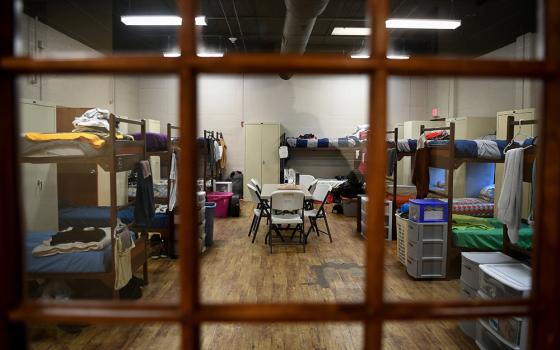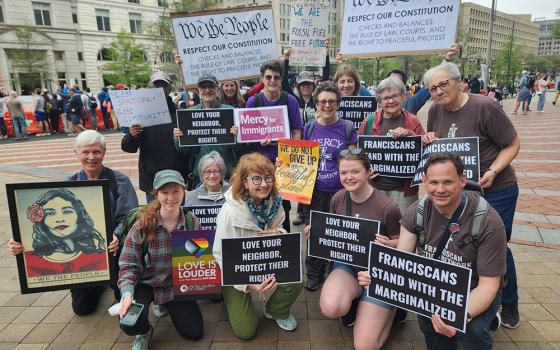
Saying "it's time for peace and unity" in his diocese, the bishop of Cleveland will not appeal the rulings of the Congregation for the Clergy regarding his 12 closed parishes. Instead, he will begin the process to restore them and reopen the churches as places of worship.
"I will not appeal the decrees to the Apostolic Signatura," said Bishop Richard G. Lennon in a statement Tuesday. "Doing so would prolong the process a number of years and would create more uncertainty and continue to divide our Catholic family."
An advocate for one of the closed parishes welcomed the bishop's decision, saying it was a step toward healing communities battered by the three-year struggle.
The church reform group FutureChurch, which aided parish groups throughout the process, called Lennon's decision "prudent" and "a final ratification of the courage of Cleveland Catholics whose love for their parish communities led them to appeal."
Earlier reports had the congregation ruling in favor of 13 appealing parishes, but Lennon stated he received only 12 decrees concerning parish restoration and church reopening. Sources have indicated one or two additional parishioner groups might have filed appeals to have their parish names changed or restored rather than reopen their church or restore their parish.
The 12 successfully appealing parishes included St. Mary and St. John the Baptist parishes in Akron; St. Mary parish in Bedford; St. Adalbert, St. Barbara, St. Casimir, St. Emeric, St. Patrick, St. Peter and St. Wendelin in Cleveland; St. James in Lakewood; and St. Mary in Lorain.
Some were uncertain what Lennon would ultimately decide to do.
"We were pretty confident on knowing what was said in those decrees; however, we weren't too confident that Bishop Lennon would follow the decrees," said Patricia Schulte-Singleton, head of parish advocate group Endangered Catholics.
In early March, the appealing parish groups began receiving word of the congregation's rulings, overturning Lennon's March 2009 plan to close the parishes as part of the 50 closed through mergers and shutdowns. The former auxiliary bishop in the Boston archdiocese said the closings were because of demographic shifts, a shortage of priests and financial troubles.
Those reasons, said canon lawyer Sr. Kate Kuenstler, are no longer legitimate reasons for closing a church.
"There's a whole new attitude or preference in Rome at the Congregation for Clergy and the Apostolic Signatura," said Kuenstler, a member of the Poor Handmaids of Jesus Christ. "And that is the bishops must follow the canon law requirements for relegating a church building to secular state, and the first requirement is that a grave reason be given."
Kuenstler, who wrote a 28-page commentary of the decrees for the parishioners, said the reasons Lennon provided -- shortages of people, priests and funds -- are no longer considered grave reasons, whereas a church destroyed by a fire or natural disaster or extensive deterioration of a church building's structure are.
Peter Borre, an adviser to several parishioner groups and leader of Boston-based Council of Parishes, said the precedent set by the Cleveland appeals is that U.S. bishops should be very careful not to engage in wholesale mergers and suppressions of parishes, saying the scale of attempts there and in Boston "has caught the attention of Rome."
"I think the message for other American ordinaries should be loud and clear, that they better not cut corners when it comes to canonical procedures, even if in the past they'd seemed to be something of a nuisance," Borre said.
"It doesn't mean that not a single parish may be suppressed any longer -- far from it -- but it means bishops are going to have to be very careful," he said.
The decrees from the congregation ruled that Lennon erred both procedurally and substantively in both the suppression of the parishes and closing of the churches. Borre described the congregation's decrees as "a landmark series of decisions" in both magnitude (12 parishes) and scope (parishes must be restored and churches reopened).
"Above all, it has to be said that no diocesan bishop in the history of Catholic America has been repudiated so strikingly by his own hierarchical superiors in Rome. Is the bishop of Cleveland capable of drawing the obvious conclusion?" he said, pointing toward Proverbs 22:10, which reads, "Expel the arrogant and discord goes too; strife and insult cease."
Upon receiving the decrees March 14, Lennon had 60 days to decide whether to appeal to the Apostolic Signatura, the Vatican's supreme court. He made his decision not to appeal in 35 days after consulting with members of the Presbyteral Council and the Diocesan Pastoral Council and meetings with various clergy, laity and experts in church law. He did not meet with any groups representing the appealing parishes.
Some say Lennon making his decision in roughly half the allotted time had to do with motions filed in Rome requesting the congregation to order he enact the decrees.
Borre said he was in Rome on March 30 to personally see that three motions filed by three parish groups were delivered to the congregation before Palm Sunday and Holy Week.
"I'm guessing that those three motions did have an impact because we made the point that we were coming into Holy Week, Palm Sunday and then Holy Week, and that it was a scandal for these churches to remain locked up, and I hope that caught some attention," he said.
Borre also said along with the three motions, the congregation received two additional documents: a cartoon from the Cleveland Plain-Dealer depicting Pope Benedict XVI breaking the lock on a chained-up church door, and a photograph of a Cleveland-area electronic billboard with the words, "Grazie, al Vaticano" ("Thank you, Vatican").
"And these two visuals, these two pieces of paper were delivered to the congregation; I know that for a fact," Borre said. "And I believe that they circulated and generated quite a bit of interest."
Lennon has not indicated a timeline for the reopening of the churches, but indicated in his statement the first steps in the process.
"In preparing to open the parishes," he said, "I will assign and work closely with clergy leaders to coordinate planning for the restoration of parish operations, the return of sacred objects that were removed for safe keeping and any cleanup or minor maintenance that might be required. We will work with the priests and parishioners as they reestablish their parishes."
Schulte-Singleton, a member of St. Patrick parish, said while she had hoped Lennon had decided not to appeal a few weeks ago, she was relieved and happy.
"We are quite relieved, and hopefully that whole process will be a rather smooth one, and we'll see where it goes from here. I can speak for St. Patrick's that we do intend to make sure that we are restored fully with all of our assets, property, everything," she said.
Schulte-Singleton said Lennon's non-appeal is a step toward healing and unity for the diocese and the parishioners and neighborhoods affected by the three-year struggle.
"It's hard to turn back the clock as far as the hurt, the anger. We all have to get past that, and I think that will happen as long as full restoration and reopening happens like it should in a timely fashion," she said.
St. Joseph Sr. Christine Schenk, executive director of FutureChurch, said the decision provides Lennon "an opportunity to start off in a more positive way to earn the positive energy and affection of the people of Cleveland."
Others were more skeptical.
While Borre called Lennon's decision not to appeal "very big," he criticized the bishop for saying the restored parishes will have to face many of the challenges that led to their closing.
"As is true for all parishes," read Lennon's statement, "it will be essential for each of these parishes to demonstrate on an ongoing basis that they have the active membership and the financial wherewithal to sustain themselves."
"For Lennon now to be cautioning the people whose parishes he must reopen on what they must [be] doing is just shameless," Borre said. "He brought about the destruction and the dispersion of these groups.
"He must pay every cent that was owned by the parish at the time of suppression, and he must pay every cent that is involved in repairing and restoring not just the church but the other buildings in the parish," he said.
"You don't bring somebody out of a coma in five or 10 minutes," Borre added. "These parishes are going to need a few years -- at least as many as he stole from them -- to bring themselves back to vibrancy. He is the last person who has any legitimacy in laying down markers on how this should be accomplished."
[Brian Roewe is an NCR Bertelsen intern. His email address is broewe@ncronline.org.]



